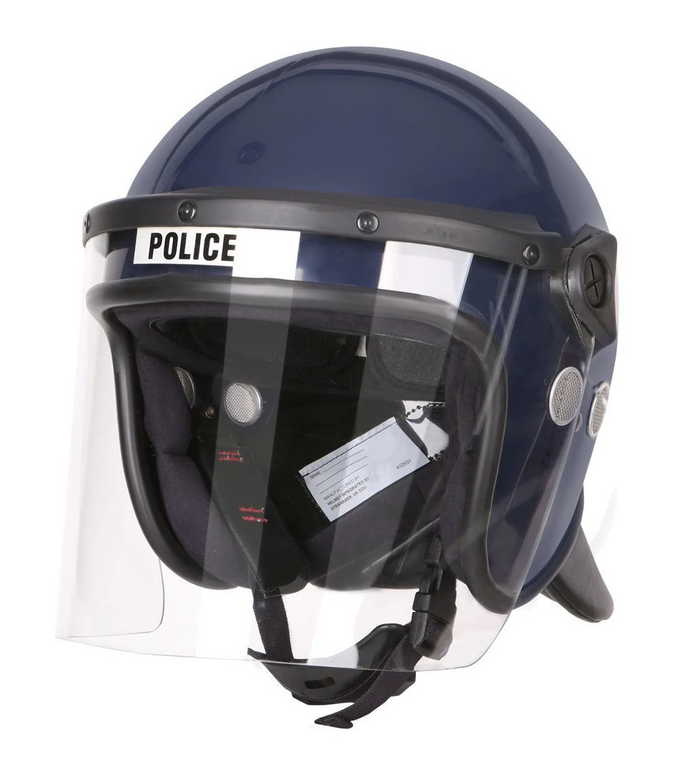
Argus Anti-Riot Helmet
ArgusPlease note this item has been discontinued. We now offer the P100NA from Schuberth.
Argus Anti-Riot Helmet
The Argus 017T Public Order/Riot Helmet is a robust, safe and reliable helmet that has been manufactured and tested to meet recognized standards It has been specifically designed for the rigorous operational requirements of public order and security duties.
The Argus Public Order (Anti-Riot) Helmet Model O17T features a multisize, self-coloured Thermoplastic shell fitted with energy absorbing EPS liner, high impact Polycarbonate visor and replaceable Neck protector. The helmet shell incorporates four metal gauze audio inserts, which are resistant to the ingress of liquids and ignited substances.
The high comfort flame-retardant interior features replaceable cheek Pads, Sizing Pads, Crown Pads and a Chinstrap fitted with Chin-Cup and Quick Release Buckle. The helmet is designed to provide protection against Impacts, Liquids & Ignited Substances for use by Police, Prison & Security Services.
Features
- Approved to BS PAS017:1995 (Amendment 1)
- Manufactured in high impact, self-coloured Acrylonitrile Butadiene Styrene (ABS) Thermoplastic
- High impact resistant 2mm or 3 mm polycarbonate visors, with anti-mist and anti-scratch coating available
- Adjustable fire-retardant chin strap with chin cup and quick release facility
- Liquid and flame resistant, metal gauze audio apertures to enable local commands to be heard
- Ability to wear a range of full face respirators
- Ability to fit variety of radio communication devices
- Weight: 1.5kg (3.31 lbs)
- Colours: Black, Blue
- Available in a wide range of head sizes (50 – 63 cm) (Size 00 – 5)

- Insignia and rank markings can be applied
- Torch mounting system available
- Protective helmet bag available for storage and transportation when not in use
Specifications
- Improved Impact Test Method
Improved impact test method using ‘dropping headform’ equipment and a greater area of testing on the helmet. Testing is carried out for both shock absorption and penetration. - High Energy Penetration Protection
Increased energy applied during penetration testing of the helmet - metal striker with a 3kg mass dropping from 2 meters. - Simulated Weather Conditioning
Testing carried out after conditioning the test helmets at +50c or -20c for between 4 and 24 hours. - Ultra Violet Conditioning
Subjected to water spray for up to 24 hours, followed by ultra-violet conditioning for 400 hours prior to impact and penetration testing, simulates sunlight and weather factors. - Solvent Conditioning
Solvent conditioning is carried out by wiping over all regions of the helmet shell, mountings, fixings, and attachments to simulate contact with solvents paints etc., before testing. - Retention System
A two-part test which includes dynamic retention system strength test and a roll-off test. The dynamic retention system strength test ensures a limited amount of stretching of the chinstrap and fixings. The roll-off test applies an external dynamic force to roll the helmet off the head in a forward direction to confirm helmet retention under arduous conditions. - Visor Protection and Field of Vision
The visor is required to have a minimum area of coverage giving protection against projectiles, solids or liquids, while maintaining a minimum field of vision. A steel ball of 6.35mm diameter is fired at the visor to the front and side at a speed of 120m/second (approximately 270MPH). There must be no failure due to cracks or deformation enabling the visor to come in contact with the headform surface. - Optical Clarity Testing
Optical tests are carried out on the visor to ensure enough light passes through and that images are not distorted. The visor is conditioned at +50c before this test is carried out. - Chemical / Flammable Protection
To ensure that the helmet and visor protect the wearer against flammable liquids, the helmet is set up on a headform and a flammable solvent mixture is poured over the helmet crown, ignited and allowed to burn. There should be no flame or burning after 10 seconds, and the assembly is then inspected for any degradation or hazard to the wearer. A second test consists of applying a propane gas flame to various parts of the helmet for a period of 30 seconds. The helmet should not continue to burn for more than 5 seconds after removal of the flame.
Materials
- Shell: High impact self-colored fire retardant Acrylonitrile Butadiene Styrene (ABS) Thermoplastic
- Liner: High density Expanded Polystyrene (EPS)
- Cheek Pads: Fire-retardant cotton modal
- Sizing Pads: Low density foam padding with cloth covering
- Chin Strap: Fire-retardant Nomex
- Chin Cup: Fire-retardant Polypropylene
- Neck Guard: High density foam with flame retardant PVC covering
- Visor: High impact optical grade polycarbonate (Optional 2mm or 3mm and anti-mist, anti-scratch coating)





